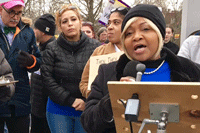The General Assembly’s Appropriations Committee, empowered with budget-writing authority, held a public hearing on the proposals that ran all day and late into the evening. Nearly 100 people — the majority of them union members — signed up in advance to testify in person at the Legislative Office Building (LOB). Scores more, including police and corrections officers, teachers and paraeducators, scientists and university professors, submitted written statements on the raised bills.
Click here to access the written testimony provided to the committee.
Among the first speakers at the hearing was the Rev. Josh Pawelek, the parish minister of the Unitarian Universalist Society: East in Manchester. Speaking on behalf of the Democracy, Unity and Equality (D.U.E. Justice) coalition, he delivered a powerful rebuke of the anti-collective bargaining proposals, calling them “profoundly immoral.”
Rev. Pawelek told lawmakers that unions stood “as a bulwark against the downward spiral in wages and benefits in the so-called ‘right to work’ states.” He added that they also serve as a “check on the authoritarian tendencies of governments and corporations that would silence working people.”
Click here to watch Rev. Pawelek’s testimony to the committee.
Legislative leaders from the Democratic caucuses in the State House and Senate later that morning held a capitol news briefing to demonstrate their opposition to the anti-collective bargaining proposals. They invited both private and public sector union members to join them in urging their colleagues make better choices for closing state budget shortfalls than “hitting the middle-class harder.”
“This is an attack not only on public sector but also private sector workers,” said Harry Rodriguez (right), a Neonatal Intensive Care Unit (NICU) coordinator at L+M Hospital in New London. “The right to collectively bargain has been a source for workers to achieve not only a voice in the workplace but also as a means to maintain a living wage,” added Rodriguez, who serves as president of our AFT Connecticut-affiliated L&M Healthcare Workers (HCW) union.
Click here for press reporting on the news briefing.
Hundreds of union members throughout the day cycled through the Capitol, amplifying Rodriguez’ message so it would be heard by state lawmakers. In testimony and one-on-one meetings with their elected representatives they made clear that these bills threaten to make Connecticut’s highest in the nation income inequality worse.
A press conference held later in the afternoon by Rev. Pawelek and other faith leaders in D.U.E. Justice underscored the implications of risking working peoples’ health and wellbeing.
“Cutting funding for vital public services, slashing wages and undermining the rights to bargain collectively will not help workers,” student Brian Becker said at the coalition’s press conference. “Our answers won’t be found in budget cuts or a race to the bottom. We should empower Connecticut’s workforce, not undermine it,” added Becker, who attends Central Connecticut State University in New Britain.
 Paraeducator Shellye Davis (left) at the Minuteman Park rally that afternoon laid out the path forward for union members, people of faith and advocates for working people. She moved the crowd to chant with the rallying call, “it is time once more to rise up!”
Paraeducator Shellye Davis (left) at the Minuteman Park rally that afternoon laid out the path forward for union members, people of faith and advocates for working people. She moved the crowd to chant with the rallying call, “it is time once more to rise up!”“It is time to reverse the decline of the middle class and to resist the special interests that have rigged our economy,” said Davis, who works with students at the Moylan School’s Expeditionary Learning Academy in the Capital City. “Organizing more women and men into our movement must be our biggest priority after we defeat this offensive legislation that threatens a voice for all working people,” added Davis, who serves as our affiliated Hartford Federation of Paraprofessionals co-president.
Click here to watch highlights of the rally, including some of Davis’ remarks.
While the bills heard last Friday attack the public sector workforce, other legislative proposals have been introduced threatening to cut the minimum wage and further marginalize women, immigrants and students. The need for union members to be “all in” to defend not just their rights, but a voice for all working people, is as great as in our lifetimes.
Click here for our previous report on anti-union legislative attacks.


